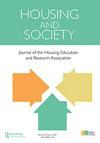Prefabricating marginality: long-term housing impacts of displacement in post-disaster Montserrat
Q2 Social Sciences
引用次数: 2
Abstract
ABSTRACT This paper investigates the long-term housing impacts of displacement and explores how these vary across disaster-affected populations. The Caribbean island of Montserrat, an overseas territory of the United Kingdom, provides an excellent setting for examining this relatively understudied topic. Following the eruption of the Soufrière Hills volcano, beginning in 1995, most Montserrat residents were displaced and the island’s south was declared an exclusion zone. The paper draws on interviews with 89 randomly selected residents, including displacees and non-displacees, and with 10 Montserratian and United Kingdom officials charged with responding to post-disaster needs. The paper seeks to understand variation in long-term housing conditions with a focus on the impact of housing type. The results show that interviewees living in housing built for, rather than by, displacees had significantly lower housing satisfaction scores, with residents of prefabricated houses reporting the lowest scores. Interviewees argued that the top-down provision of these houses was problematic due to limited local input and use of materials poorly suited to local conditions and traditions. The paper concludes by situating the findings in the context of the literature on post-disaster housing and by arguing for increased attention to how such housing is provided in terms of both process and materials.预制边缘化:灾后蒙特塞拉特流离失所者对住房的长期影响
本文研究了流离失所对住房的长期影响,并探讨了这些影响在受灾人群中的差异。加勒比蒙特塞拉特岛是联合王国的海外领土,为研究这一研究相对较少的专题提供了一个极好的背景。自1995年soufri山火山爆发以来,大多数蒙特塞拉特居民流离失所,该岛南部被宣布为禁区。该报告采访了89名随机选择的居民,包括流离失所者和非流离失所者,并采访了10名负责应对灾后需求的蒙特塞拉特和英国官员。本文旨在了解长期住房条件的变化,重点关注住房类型的影响。结果显示,居住在为流离失所者建造而不是由流离失所者建造的住房中的受访者的住房满意度得分明显较低,预制房屋的居民报告的得分最低。受访者认为,由于当地投入有限,材料使用不适合当地条件和传统,自上而下提供这些房屋是有问题的。本文的结论是将研究结果置于灾后住房文献的背景下,并主张增加对如何在过程和材料方面提供此类住房的关注。
本文章由计算机程序翻译,如有差异,请以英文原文为准。
求助全文
约1分钟内获得全文
求助全文
来源期刊

Housing and Society
Social Sciences-Urban Studies
CiteScore
2.30
自引率
0.00%
发文量
10
期刊介绍:
Housing and Society is the journal of the Housing Education and Research Association (HERA). The journal supports the mission of HERA by providing for the dissemination of research and other scholarly work. Submissions from a broad range of perspectives are encouraged. Topics in housing include: policy, design, social aspects, gerontology, behavioral aspects, energy/environment, equipment, interiors, economics, theory/model development, education, and program development or evaluation. The journal welcomes the submission of original research articles, notes and commentaries. Notes are shorter manuscripts presenting succinct information on housing related to one of the following categories: - Research: exploratory or not heavily theory-based or statistically analyzed - Academic: innovative teaching ideas - Program: development, implementation, and/or evaluation of Cooperative Extension or other housing programming efforts - Policy: examination of policy impact, comparative analysis, and/or need to achieve housing goals - Reviews: books, documentaries, etc.
 求助内容:
求助内容: 应助结果提醒方式:
应助结果提醒方式:


